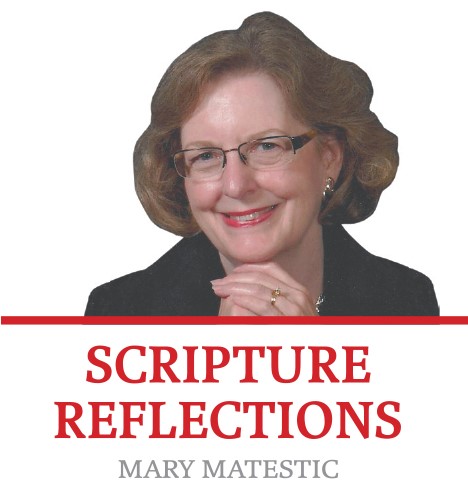Scripture Reflections, Sunday, Dec. 19, 2021
Sunday, December 19, 2021
Fourth Sunday of Advent
Micah 5:1-4a
Hebrews 10:5-10
Luke 1:39-45
Peering through the window of Zechariah’s house, we watch the embrace of two women who carry the seamless thread of God’s salvific promise in their wombs. Elizabeth and Zechariah both come from priestly families, and within Elizabeth’s womb is a child who will become a prophet, a voice that cries in the wilderness. Elizabeth doesn’t know it yet, but we do, which makes this passage more enriched.
Mary, the visitor who came in haste to the home of Elizabeth, has taken her cue from the angel that all things are possible with God. Her faith is palpable. Mary holds in her womb Jesus, who will be called Son of the Most High. He will be holy, the Son of God. Quietly present in the visitation scene is the symbol of voice. Let us listen.
Zechariah has lost his voice. Elizabeth has lived with her silent husband for six months. With Mary’s visit comes a voice which breaks through the silence of the household. Mary’s greeting causes the baby in Elizabeth’s womb to leap with joy. It is Mary’s voice that awakens within Elizabeth the Holy Spirit, and it is Elizabeth’s voice which confirms for Mary that she is indeed the mother of “my Lord.” I am touched by the use of the word “my.” It signals Elizabeth’s intimacy with God. For Elizabeth, it is not “the Lord,” but “my Lord.”
The promise of salvation abides in their greeting, while Luke records for us a rare dialogue between two women in the Scriptures that will break forth into Mary’s “Magnificat,” a solo, ecstatic proclamation of the fulfillment of God’s holy plan.
Elizabeth cries out in a loud voice. She calls Mary “blessed” three times. First, Mary is blessed among women. Mary is blessed among women because she has placed herself completely at the disposal of God’s sacred will. It is no small secret that throughout the Old Testament, God desired his people to be obedient. The Book of Hebrews makes it clear that sacrifices and sin offerings are not at the top of the list of things God desires. Rather, what God longs for is obedience. Mary has offered her body to the plan of God. Her “fiat” and the overshadowing of the Holy Spirit marks her as the new Ark of the Covenant where the glory of God dwells.
Second, the fruit of Mary’s womb is blessed. Pregnancy is not easy. One’s body becomes the home of a wee stranger who will make his way into the world through its mother’s love. It is Jesus who abides there. It is Jesus who will take his nutrients from his mother’s diet, stretch her womb, push through her belly and make his way through her birth canal. Mary has come to Elizabeth’s home to watch the miracle of Elizabeth’s birth, to become a doula-type for her kinswoman, paying attention to how and what signs to look for as her own baby comes to birth. Indeed, the fruit of Mary’s womb is blessed.
Third, Mary is blessed because she believed that what was spoken to her by the Lord would be fulfilled. Mary’s faith in the living God, along with her own anticipation for the coming of Messiah, has distinguished her as blessed. Like Abraham and Sarah before her, Mary takes her place among those who believed that what God spoke to them would come to be. She is the one who knows deeply God’s saving help for Israel, God’s mercy and the promises made to her fathers, to Abraham and to all the descendants before her.
Elizabeth is indeed a prophet in this text. She sees beyond what the eyes can catch. Her insights into Mary’s divine call have transcended what could be known humanly. Her own miraculous pregnancy has prepared her for this mystical visitation, has prepared her to see with eyes that can celebrate blessedness. And if we could talk about prophetic genes, it is Elizabeth and Zechariah who will consecrate their son, John, to the Lord, and it is he who will bless many with his own voice. In the waters of the Jordan, John will meet Jesus years later, inheriting his mother’s prophetic voice. It is John who will cry out: “There is the Lamb of God who will take away our sins.”
The Visitation of Mary and Elizabeth is no small matter. It marks the height of salvation history. We won’t hear much from Mary from this point on. We will be with her when she gives birth in humble settings. We will see her at the wedding feast of Cana. We will see her standing at the Cross looking into the eyes of her Son, who perhaps drew strength from her there as he drew life from her in the womb. Elizabeth, too, is quieted in the sacred scriptures.
In the next days, as we open up to the full reality of the Incarnation, we will have opportunity to meet with many family members, folks near or far. Let us, like Elizabeth and Mary, attend to the voices of those we love, offering them the same embrace and holy hospitality worthy of Christmas.

